S P E C I A L R E P O R T
Interview with José Manuel Mendonça
Review of a year as a President 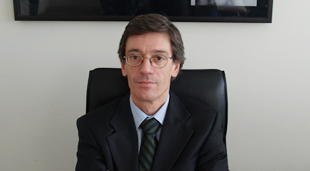
BIP: How do you look at this year and a half of leadership of INESC Porto? Did it correspond to your expectations?
José Manuel Mendonça: My evaluation is fairly positive. In personal terms, the performance of this role already familiar to me has been a huge challenge. I had had some prior experience in similar functions, first in INESC Porto as post-doctoral researcher in 1986, then as manager of UESP in 1996, and then, for the 10 following years, as an executive administrator of Agência de Inovação and Ilídio Pinho Foundation.
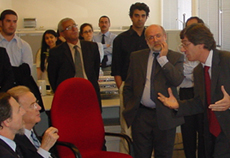 INESC Porto is not a company but it has a model organisation and a professional management, at all levels. It is possible to guarantee organisational efficiency, flexibility and effectiveness that are required in every company and organisation, in every sector. INESC Porto is not a company but it has a model organisation and a professional management, at all levels. It is possible to guarantee organisational efficiency, flexibility and effectiveness that are required in every company and organisation, in every sector.
The exercise of the compatibility between agendas and the researchers’ and students’ or employees’ personal motivations has been rather gratifying, in a very particular environment, in a universe with so many models, visions and utopias of “how things should be” in this world of research – and a clear line of the institution’s strategic development.
This is, to develop and maintain an environment that stimulates the favouring of the institutional agenda, considering INESC Porto’s mission: to produce science of international level, but to grant that effort a sense of utility, in terms of its contribution to innovation and the increase of the competitiveness of companies, hospitals, public administration, University, the competitiveness of the region and country in general.
I have been taking advantage of the great autonomy and intervention ability that INESC Porto’s associates offer the Board of Directors. The Board has been able to manage the direction of the institution maybe more than with the full trust of the associates, in strategic consonance with them in most aspects. The obvious synergies result in the growing recognition of the relevance of the institution in multiple aspects of society. They also result in the recognition of the excellence of the work developed and the high competences, unique in some cases, we have.
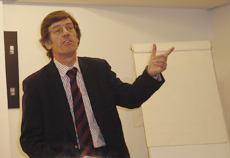 As a consequence, besides the normal tasks carried out for scientific evaluation, projects, fellowships, etc, several public and private entities are resorting to collaborators of INESC Porto for consultancy or directing jobs in very important projects and initiatives. Some examples are the National Contest in the area of Wind Power (Ministry of Economic Affairs); the Design and Pilot Test of a System of Evaluation of Secondary Schools (Ministry of Education); the Agreements between the Portuguese Government and American Universities – MIT, CMU and UTA (Ministry of Science); the Manufuture European Technology Platform (European Committee), among others. As a consequence, besides the normal tasks carried out for scientific evaluation, projects, fellowships, etc, several public and private entities are resorting to collaborators of INESC Porto for consultancy or directing jobs in very important projects and initiatives. Some examples are the National Contest in the area of Wind Power (Ministry of Economic Affairs); the Design and Pilot Test of a System of Evaluation of Secondary Schools (Ministry of Education); the Agreements between the Portuguese Government and American Universities – MIT, CMU and UTA (Ministry of Science); the Manufuture European Technology Platform (European Committee), among others.
This visibility naturally emerges from the life and protagonists of the institution and results in great benefits for us.
BIP: What was the most difficult task so far? And the easiest?
JMM: The daily affairs, the operational management, the supervision of the administrative, financial and logistic processes, the human resources, etc were surprisingly easy. We have a horizontal layer of support services with excellent performance, playing their role in a normal and rational way, without prejudice of the effectiveness and flexibility of adaptation to the demands of those who work in science, develop technology or pay R&D services to companies. Services are like a protection barrier that defends researchers from the heavy and illogical but always uncomfortable bureaucratic demands of the financing entities.
Regarding the organization of the nuclear activities, the logic of the “business” Units, with its flexible and somewhat hybrid positioning of the knowledge area versus market segment, facilitates the top management, due to the integration it favours and demands from resources, projects, results, financing and even from the scientific and intervention strategies.
For me, it was difficult, after ten years of other realities, to learn the new reality of INESC Porto, which maintained the good solid principles of the INESC model seen in the ‘80s but that evolved adapting to new times. Knowing and understanding this highly sophisticated institution required a great deal of effort.
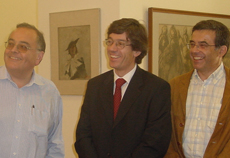 It wasn’t easy, in the beginning, to get involved in the decision processes, in which we learn to sacrifice some effectiveness in favour of the construction and reinforcement of a feeling of belonging to a group with a direct influence in the institution’s direction. It wasn’t easy, in the beginning, to get involved in the decision processes, in which we learn to sacrifice some effectiveness in favour of the construction and reinforcement of a feeling of belonging to a group with a direct influence in the institution’s direction.
The most decisive steps end up being taken by sharing the structured reflection with an important role in the institution’s life: the Comissão de Avaliação Externa, the Scientific Council and the informal forum of open executive dispatch that surprised me which is the Units’ Meeting.
Finally, and although I already knew it quite well, the financing model and the apparently obvious weaknesses of the financing entities were, and still are a big and constant challenge for management.
BIP: When BIP interviewed you in July 2005, you mentioned that the dream you would like to see fulfilled was to transform the innovation and research system as well as the country’s industrial and economic environment. Do you feel we are walking towards that? In what way?
JMM: INESC Porto offers the scientific community, universities and companies the result of its activity in scientific and more applied projects, developed technologies, capable human resources, practical knowledge and experience for the reinforcement of the education system.
And we offer the R+D+I system development and innovation, the model it has developed, solidified and effective, this is, the integration of chain value activities: research, technological development, technology transfer and economic valorization.
There are certainly other ways, other positions, other solutions, but this is our proposal and the progress is visible.
BIP: The key-words of your administration seem to be strategy and innovation. Name a few examples of measures that you have taken based on these pillars.
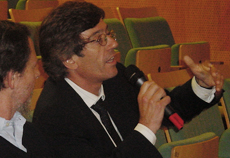 JMM: It is true that these two aspects were made explicit in the institution’s agenda after I took over, but this does not mean that, before, INESC Porto was not innovative and strategy-free. It was not like this at all. JMM: It is true that these two aspects were made explicit in the institution’s agenda after I took over, but this does not mean that, before, INESC Porto was not innovative and strategy-free. It was not like this at all.
But maybe my previous professional experience and the “external” perspective I had of INESC Porto in the country’s context, followed by the dynamics created by the 20th anniversary celebrations and the encouragement of the former President, Professor Pedro Guedes de Oliveira, towards eventually convenient and necessary changes, were stimulating.
The relevance granted to innovation, to technology transfer and to the economic valorization of knowledge is natural, considering the last 10 years of my activity and the vision that I have built on these matters myself. After working in the area of innovation in projects, several initiatives and in different aspects – technological surveillance, financing, investment, technological and market due-diligence, etc – it would be natural to bring that experience to INESC Porto to reinforce all activities downstream of science production. And I also brought it to the teaching activity, in subjects of innovation management at MIETE, in the MSc in Marketing at the Faculty of Economics and in the Masters and PhD programmes with MIT in the industrial area.
Nowadays, strategy and innovation are absolutely necessary in every organization, and by majority of reasons in institutions like ours, placed in the certainly exciting but always unstable interface between the academic and the entrepreneurial world. Given that this is an Associate Laboratory, of known relevance to the Ministry of Science, and Technological Infra-structure, of merit acknowledged by the Ministry of Economic Affairs, we can claim a role in the change of the city, the region and the country, giving the University our services to lever new things.
But the definition of strategies is not easy or simple and neither is its operationalization. Several strategies must be taken into account: research and investment in new R&D areas; positioning in the companies and administration; in the aspect of internationalization of relations and activities; public visibility with the main stakeholders, etc.
All these strategies must be fixed so that it is possible to achieve the common objectives determined by the demanding mission INESC Porto has been pursuing.
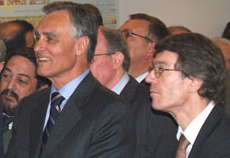 Clearly, the only way is to conciliate a rationalist, planned, top-down, reflection approach, and strategic design with an “incrementalist”, emerging, down-top practice in the everyday decision making to meet the opportunities. Such was the case of the agreements between the Portuguese governments and American universities, for which it was necessary to quickly mobilize resources and top competences in all areas. Clearly, the only way is to conciliate a rationalist, planned, top-down, reflection approach, and strategic design with an “incrementalist”, emerging, down-top practice in the everyday decision making to meet the opportunities. Such was the case of the agreements between the Portuguese governments and American universities, for which it was necessary to quickly mobilize resources and top competences in all areas.
The “measures” you are referring to were not “taken” by me. Maybe they are the result of my initiatives, but they arose from pondered decisions, studied in the Board by the five people in it. The strategic reflection process started over a year ago; the increase in the associative capital, the joining of new associates, the creation of UITT, the launching of spin-offs, etc. are the result of processes in which I may have been the catalyst but that the institution, with its richness, had already in incubation.
BIP: In an interview to Vida Económica, you stated you intended sale and direct provision of services to the companies to reach 50% in the next five years. How do you think you will manage that?
JMM: Doubling the sale and provision of services in five years without dishonouring INESC Porto’s mission is a big challenge, of course. The sale and direct provision of services to companies is a simple measure of practical utility, of economic value that companies give us or our knowledge and competences.
Of course this is not entirely up to us, it does not depend on the quality of the offer only. To a large extent, it depends on the companies, it depends on the evolution of the economic situation, on how innovation strategies will be faced, on how science and technology are seen as enablers of competitive advantages.
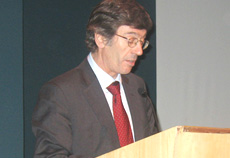 50% is a reference, a utopia. From 2005 to 2006, the value of provision of services went up in 10%, so we are on the right track, but the right track is hard. 50% is a reference, a utopia. From 2005 to 2006, the value of provision of services went up in 10%, so we are on the right track, but the right track is hard.
BIP: Would you like to send a message to INESC Porto’s collaborators?
JMM: I am one of those who believe people change/make the institutions and that the institutions change/make the social context they are in. In my opinion, in INESC Porto it’s not just about making a living, building an academic/research/professional career. In INESC Porto there is a bigger challenge. And, besides the reasonable motivations of personal and professional development, we can contribute to something bigger that goes beyond the personal agendas and pretensions.
The challenge is to contribute to turn INESC Porto into an instrument of change, this is, improvement, progress of the university, the economic environment, the companies the administration, the region and the country. It will not be the only instrument, and not the most relevant for sure, but, with everyone’s effort, I don’t question its relevance. It can actually make the difference and isn’t that a big reward for all of us?!
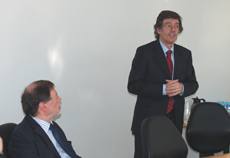 But let us not be fooled: the times are and will be difficult. We all know the short and medium term expectations for the Portuguese economy. We all know that the next structural funds that the country will benefit from may be the last and we are aware that the political priority given to science and innovation may not be sustained. The uncertainties that characterize the modern times are followed by the weaknesses of the country and region, this is, the space in which INESC Porto moves. The volatility of the context and strictness in management are, along with the courage of changing and of new initiatives, the great challenge for the Board, the great challenge for all of us. But let us not be fooled: the times are and will be difficult. We all know the short and medium term expectations for the Portuguese economy. We all know that the next structural funds that the country will benefit from may be the last and we are aware that the political priority given to science and innovation may not be sustained. The uncertainties that characterize the modern times are followed by the weaknesses of the country and region, this is, the space in which INESC Porto moves. The volatility of the context and strictness in management are, along with the courage of changing and of new initiatives, the great challenge for the Board, the great challenge for all of us. |


 INESC Porto is not a company but it has a model organisation and a professional management, at all levels. It is possible to guarantee organisational efficiency, flexibility and effectiveness that are required in every company and organisation, in every sector.
INESC Porto is not a company but it has a model organisation and a professional management, at all levels. It is possible to guarantee organisational efficiency, flexibility and effectiveness that are required in every company and organisation, in every sector.  As a consequence, besides the normal tasks carried out for scientific evaluation, projects, fellowships, etc, several public and private entities are resorting to collaborators of INESC Porto for consultancy or directing jobs in very important projects and initiatives. Some examples are the National Contest in the area of Wind Power (Ministry of Economic Affairs); the Design and Pilot Test of a System of Evaluation of Secondary Schools (Ministry of Education); the Agreements between the Portuguese Government and American Universities – MIT, CMU and UTA (Ministry of Science); the Manufuture European Technology Platform (European Committee), among others.
As a consequence, besides the normal tasks carried out for scientific evaluation, projects, fellowships, etc, several public and private entities are resorting to collaborators of INESC Porto for consultancy or directing jobs in very important projects and initiatives. Some examples are the National Contest in the area of Wind Power (Ministry of Economic Affairs); the Design and Pilot Test of a System of Evaluation of Secondary Schools (Ministry of Education); the Agreements between the Portuguese Government and American Universities – MIT, CMU and UTA (Ministry of Science); the Manufuture European Technology Platform (European Committee), among others.  It wasn’t easy, in the beginning, to get involved in the decision processes, in which we learn to sacrifice some effectiveness in favour of the construction and reinforcement of a feeling of belonging to a group with a direct influence in the institution’s direction.
It wasn’t easy, in the beginning, to get involved in the decision processes, in which we learn to sacrifice some effectiveness in favour of the construction and reinforcement of a feeling of belonging to a group with a direct influence in the institution’s direction.  JMM: It is true that these two aspects were made explicit in the institution’s agenda after I took over, but this does not mean that, before, INESC Porto was not innovative and strategy-free. It was not like this at all.
JMM: It is true that these two aspects were made explicit in the institution’s agenda after I took over, but this does not mean that, before, INESC Porto was not innovative and strategy-free. It was not like this at all.  Clearly, the only way is to conciliate a rationalist, planned, top-down, reflection approach, and strategic design with an “incrementalist”, emerging, down-top practice in the everyday decision making to meet the opportunities. Such was the case of the agreements between the Portuguese governments and American universities, for which it was necessary to quickly mobilize resources and top competences in all areas.
Clearly, the only way is to conciliate a rationalist, planned, top-down, reflection approach, and strategic design with an “incrementalist”, emerging, down-top practice in the everyday decision making to meet the opportunities. Such was the case of the agreements between the Portuguese governments and American universities, for which it was necessary to quickly mobilize resources and top competences in all areas.  50% is a reference, a utopia. From 2005 to 2006, the value of provision of services went up in 10%, so we are on the right track, but the right track is hard.
50% is a reference, a utopia. From 2005 to 2006, the value of provision of services went up in 10%, so we are on the right track, but the right track is hard.  But let us not be fooled: the times are and will be difficult. We all know the short and medium term expectations for the Portuguese economy. We all know that the next structural funds that the country will benefit from may be the last and we are aware that the political priority given to science and innovation may not be sustained. The uncertainties that characterize the modern times are followed by the weaknesses of the country and region, this is, the space in which INESC Porto moves. The volatility of the context and strictness in management are, along with the courage of changing and of new initiatives, the great challenge for the Board, the great challenge for all of us.
But let us not be fooled: the times are and will be difficult. We all know the short and medium term expectations for the Portuguese economy. We all know that the next structural funds that the country will benefit from may be the last and we are aware that the political priority given to science and innovation may not be sustained. The uncertainties that characterize the modern times are followed by the weaknesses of the country and region, this is, the space in which INESC Porto moves. The volatility of the context and strictness in management are, along with the courage of changing and of new initiatives, the great challenge for the Board, the great challenge for all of us.